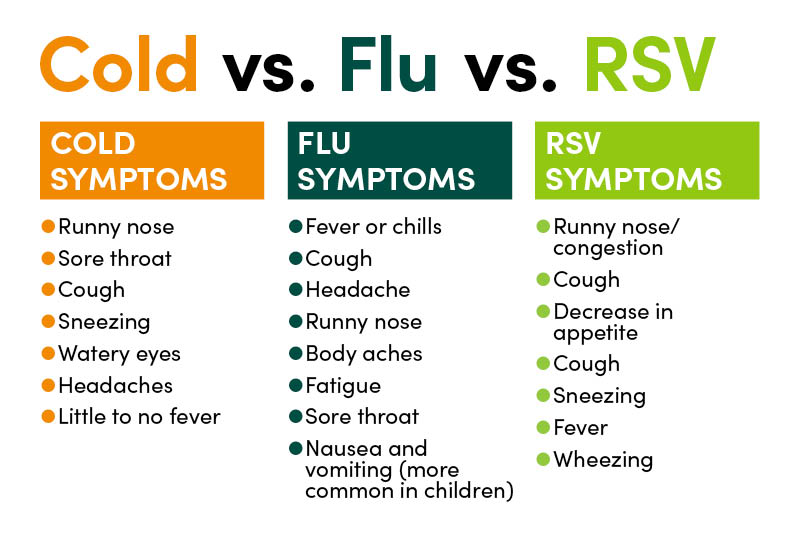
Overview: Sniffles, cough, fever — these symptoms can look the same, but the cause might not be. Cold, flu and RSV are triggered by different viruses and knowing which one you’re dealing with can help you get the right care faster.
Scratchy throat, congestion, a cough, the shivers...Winter blows in a flurry of respiratory illness to make us miserable. Sometimes it’s hard to know if you or your child has a cold, influenza (the flu) or even respiratory syncytial virus (RSV).
All three are viral infections. While they have similar symptoms, they differ in causes, severity and duration. If you’re looking for quick relief, don’t expect your family medicine provider or urgent care to prescribe antibiotics for respiratory illness. Antibiotics treat bacterial infections, such as strep throat; they aren’t effective for viral infections like cold, flu and RSV.
Instead, it’s important to rest, drink plenty of fluids, and hunker down with supportive care along with over-the-counter medications to manage symptoms.
What is a cold?
The common cold, a viral infection affecting your nose and throat, usually doesn’t require medical attention. Symptoms develop gradually over several days and last for seven to 10 days. To avoid catching or spreading a cold, wash your hands regularly and make sure you sneeze into a tissue or into your elbow.
Symptoms include:
- Runny nose
- Sore throat
- Coughing
- Sneezing
- Watery eyes
- Headache and body aches
- Little to no fever
What is influenza or flu?
The flu is a highly contagious respiratory illness caused by two main types of viruses: Influenza A and Influenza B. Different strains circulate each year, so it’s important to get an annual flu vaccination. While not 100% effective, the flu vaccine can help prevent you from getting the flu or developing serious complications. Flu season is typically December through March.
Antiviral medications, if given within a couple of days of onset, can reduce the length of time you’re sick and the risk of complications.
Flu symptoms include:
- Fever/chills
- Cough
- Sore throat
- Runny nose
- Body aches
- Headaches
- Fatigue
- Vomiting and diarrhea (more common in children)
A key flu symptom is feeling feverish or having a temperature of 100 degrees Fahrenheit or above. However, not everyone with the flu will have a fever. Although you or your child may experience nausea and vomiting, influenza is not the same as gastroenteritis, often called the “stomach flu.”
Most people recover from the flu on their own, however, in some cases the flu can lead to complications like pneumonia, bronchitis, sinusitis, dehydration and seizures in children.
What is RSV?
RSV is a common virus that affects the middle part of the lungs and breathing. The most common symptom of RSV is excessive clearing of upper airway secretions.
RSV is most concerning for older adults and children under age 2, and especially those younger than a year, who struggle to clear their airway secretions to breathe and eat. Wheezing RSV can also worsen asthma, chronic lung disease and congestive heart failure. Ask your primary care provider if you should get the RSV vaccine. RSV season is typically December through March.
Common RSV symptoms include:
- Runny nose
- Coughing
- Fever
- Loss of appetite
- Dehydration
Croup or RSV? A parent's guide
How do I know which virus my child has?
Knowing where your child was exposed -- childcare, school or family -- helps to narrow down the virus and symptoms. However, testing for RSV or the flu is the only definitive way to distinguish what the virus is.
Schedule an appointment for your child if they have symptoms including:
- Fever over 101 degrees Fahrenheit.
- Fussiness and decreased sleep.
- Any respiratory symptoms interfering with the ability to sleep or eat.
- Decreased urine output.
Remember: Prevention is key. Handwashing is highly effective. If you or your child feels ill, stay home to help prevent the spread of a virus.
This blog was medically reviewed by a MercyOne provider.
